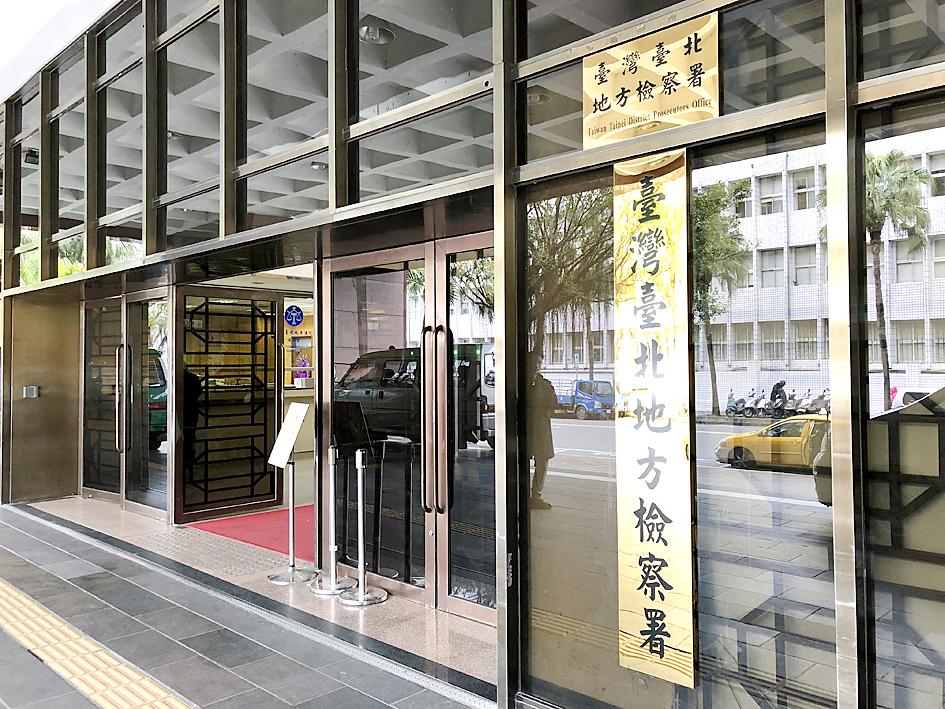The Taipei District Prosecutors’ Office has indicted a 37-year-old woman for allegedly scalding her mother to death in a bathtub.
On June 9 last year, the mother, who was in her 70s, was reported dead in the bathroom at home.
While relatives initially thought she had died from a bath-related accident, prosecutors who inspected the body noticed that there was swelling and peeled off skin.

Photo: Chien Li-chung, Taipei Times
A forensic report concluded that the mother had second-degree burns over a large part of the lower half of her body, which sent her into cardiogenic shock, leading to her death.
Prosecutors said the daughter, surnamed Pan (潘), who was unemployed, initially denied knowing what happened to her mother, but later allegedly confessed to her involvement after the coroner concluded the autopsy.
Prosecutors quoted Pan as saying that she was upset with her mother for not buying her Golden Ray puppetry discs, adding that she had added cold water to the bathtub and it had not been her intention to hurt her mother.
Police and prosecutors found many A4 sheets of paper pasted around the house and on the bathroom walls blaming Pan’s mother for not keeping her promises to do things for her.
Prosecutors reconstructed the scene based on the water stains in the bathtub and the places where peeling skin had stuck to the bathtub and the edge of the door.
The hot water coming out of the faucet, as well as in the bathtub after being in contact with air, could reach up to 60°C, prosecutors said.
The mother’s severe burns could only have been caused by sitting in the hot water for at least five hours, they said.
Prosecutors on Wednesday charged Pan with intentionally injuring others, resulting in death, stating that Pan, aware that her mother’s sense of temperature in the lower half of her body was impaired due to a stroke, still allegedly demanded her mother to get in the bath and stay there for a long period.
Chi Ching-chi (紀景琪), a doctor at Linkou Chang Gung Memorial Hospital’s Department of Dermatology, said that it would usually take water of more than 70°C to inflict second-degree burns.

Taiwan has received more than US$70 million in royalties as of the end of last year from developing the F-16V jet as countries worldwide purchase or upgrade to this popular model, government and military officials said on Saturday. Taiwan funded the development of the F-16V jet and ended up the sole investor as other countries withdrew from the program. Now the F-16V is increasingly popular and countries must pay Taiwan a percentage in royalties when they purchase new F-16V aircraft or upgrade older F-16 models. The next five years are expected to be the peak for these royalties, with Taiwan potentially earning

STAY IN YOUR LANE: As the US and Israel attack Iran, the ministry has warned China not to overstep by including Taiwanese citizens in its evacuation orders The Ministry of Foreign Affairs (MOFA) yesterday rebuked a statement by China’s embassy in Israel that it would evacuate Taiwanese holders of Chinese travel documents from Israel amid the latter’s escalating conflict with Iran. Tensions have risen across the Middle East in the wake of US and Israeli airstrikes on Iran beginning Saturday. China subsequently issued an evacuation notice for its citizens. In a news release, the Chinese embassy in Israel said holders of “Taiwan compatriot permits (台胞證)” issued to Taiwanese nationals by Chinese authorities for travel to China — could register for evacuation to Egypt. In Taipei, the ministry yesterday said Taiwan

‘LIKE-MINDED PARTNER’: Tako van Popta said it would be inappropriate to delay signing the deal with Taiwan because of China, adding he would promote the issue Canadian senators have stressed Taiwan’s importance for international trade and expressed enthusiasm for ensuring the Taiwan-Canada trade cooperation framework agreement is implemented this year. Representative to Canada Harry Tseng (曾厚仁) in an interview with the Central News Agency (CNA) said he was increasingly uneasy about Ottawa’s delays in signing the agreement, especially as Ottawa has warmed toward Beijing. There are “no negotiations left. Not only [is it] initialed, we have three versions of the text ready: English, French and Mandarin,” Tseng said. “That tells you how close we are to the final signature.” Tseng said that he hoped Canadian Prime Minister Mark Carney

POSITIVE DEVELOPMENT: Japan and the US are expected to hold in-depth discussions on Taiwan-related issues during the meeting next month, Japanese sources said The holding of a Japan-US leaders’ meeting ahead of US President Donald Trump’s visit to China is positive news for Taiwan, former Japan-Taiwan Exchange Association representative Hiroyasu Izumi said yesterday. After the Liberal Democratic Party’s landslide victory in Japan’s House of Representatives election, Japanese Prime Minister Sanae Takaichi is scheduled to visit the US next month, where she is to meet with Trump ahead of the US president’s planned visit to China from March 31 to April 2 for a meeting with Chinese President Xi Jinping (習近平). Japan and the US are expected to hold in-depth discussions on Taiwan-related issues during the